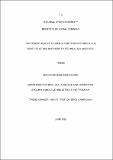DSpace Repository
THE PERCEPTIONS OF STUDENTS AND TEACHERS ABOUT THE BENEFITS OF AND BARRIERS TO TECHNOLOGY AIDED EFL
JavaScript is disabled for your browser. Some features of this site may not work without it.
| dc.contributor.author | Mohammed, Mahmood İmad
|
|
| dc.date.accessioned | 2019-05-16T14:24:50Z | |
| dc.date.available | 2019-05-16T14:24:50Z | |
| dc.date.issued | 2015 | |
| dc.identifier.uri | http://hdl.handle.net/11547/1968 | |
| dc.description.abstract | Bu araştırmada Yabancı dil öğretiminde öğretmen ve öğrencilerin teknolojinin sağladığı yararlar, karşılaşılan sorunlar ve engeller hakkında görüşleri alınmıştır. Araştırma Kuzey Irak Erbil kentindeki Selahaddin üniversitesi, Eğitim Fakültesi İngilizce Öğretmenliği Bölümündeki 50 öğretmen ve 130 öğrenciden anket yoluyla veri toplanmıştır. Ayrıca 10 öğretmen ve 10 öğrenci ile mülakat yapılmıştır. Araştırmada hem öğretmenlerin ve hem de öğrencilerin yabancı dil öğretimine teknolojinin entegre edilmesine karşı olum tutum sahibi olmalarına karşın, bu okullarda yeterli teknolojinin bulunmadığı ya da mevcut teknolojiyi öğrencilerin kullanmadıkları bazı engellerle karşılaştıkları sonucuna varılmıştır. Bu engellerin başında yetersiz teknolojik donanım, bilgi ve zaman yetersizliği ve eğitim eksikliği bulunmaktadır. Araştırma sonunda gerekli öneriler yapılmıştır. Bu önerilerden bazıları teknoloji için yeterli finansman sağlanmalı, teknoloji kullanımına yönelik eğitim programları düzenlenmelidir. | tr_TR |
| dc.language.iso | tr | tr_TR |
| dc.publisher | ISTANBUL AYDIN UNIVERSITY INSTITUTE OF SOCIAL SCIENCES | tr_TR |
| dc.subject | Teknoloji Destekli Dil Öğretimi (TAEFL) | tr_TR |
| dc.subject | Tutum | tr_TR |
| dc.subject | Engeller | tr_TR |
| dc.subject | Dil Eğitimini Kolaylaştıran Teknoloji (TAEFL) | tr_TR |
| dc.subject | Technology Aided English As A Foreign Language (TAEFL) | tr_TR |
| dc.subject | Attitudes towards TAEFL | tr_TR |
| dc.subject | Benefits of and Barriers to TAEFL | tr_TR |
| dc.subject | Frequency of Using Technology | tr_TR |
| dc.title | THE PERCEPTIONS OF STUDENTS AND TEACHERS ABOUT THE BENEFITS OF AND BARRIERS TO TECHNOLOGY AIDED EFL | tr_TR |
| dc.type | Thesis | tr_TR |
| dc.description.abstractol | In this study the viewpoints and feelings of EFL students and EFL teachers on the benefits of and barriers to technology aided English as a foreign language (TAEFL) were examined. This study was conducted at Salahaddin University - College of Languages - Department of English Language in Erbil, in the North of Iraq. The purpose of the study was to understand the attitudes of EFL students and teachers who use technology for educational purposes towards the use of technology in the process of English language learning and teaching. In addition, the study aimed to find out the participants EFL students and teachers frequency of technology use. Finally, the study examined the barriers that the EFL students and teachers encounter while using technology. The questionnaires and interviews were administered in order to collect the data. The first questionnaire was administered to 130 EFL students at Salahaddin University - College of Languages - Department of English Language whose educational grades were first, second, third and fourth year students. The second questionnaire was administered to 50 EFL teachers at Salahaddin University - College of Languages - Department of English Language whose educational degrees were PhD, MA and MA student. Furthermore, in order to get more information, ten EFL students and ten EFL teachers were interviewed in this study. The findings of this study indicated that in spite of having positive attitudes towards integration of technology in EFL, the participants of EFL students and teachers did not use technology in their English language too much. In addition, the use of technology is not too much due to several barriers. Deficiencies and constraints of technological instruments, financial supports, lack of time, lack of information about how to use various types of technological equipment and programs, and lack of effective training courses are the challenges that discourage and prevent the participants EFL students and teachers from utilizing and integrating technology into their English language learning and teaching process. Finally, this study presented several pedagogical suggestions such as providing sufficient funds for technological instruments and training courses in order to increase technology integration in EFL. | tr_TR |
| dc.publisher.firstpagenumber | 1 | tr_TR |
| dc.publisher.lastpagenumber | 113 | tr_TR |
Files in this item
This item appears in the following Collection(s)
-
Tezler -- Thesis [3470]
